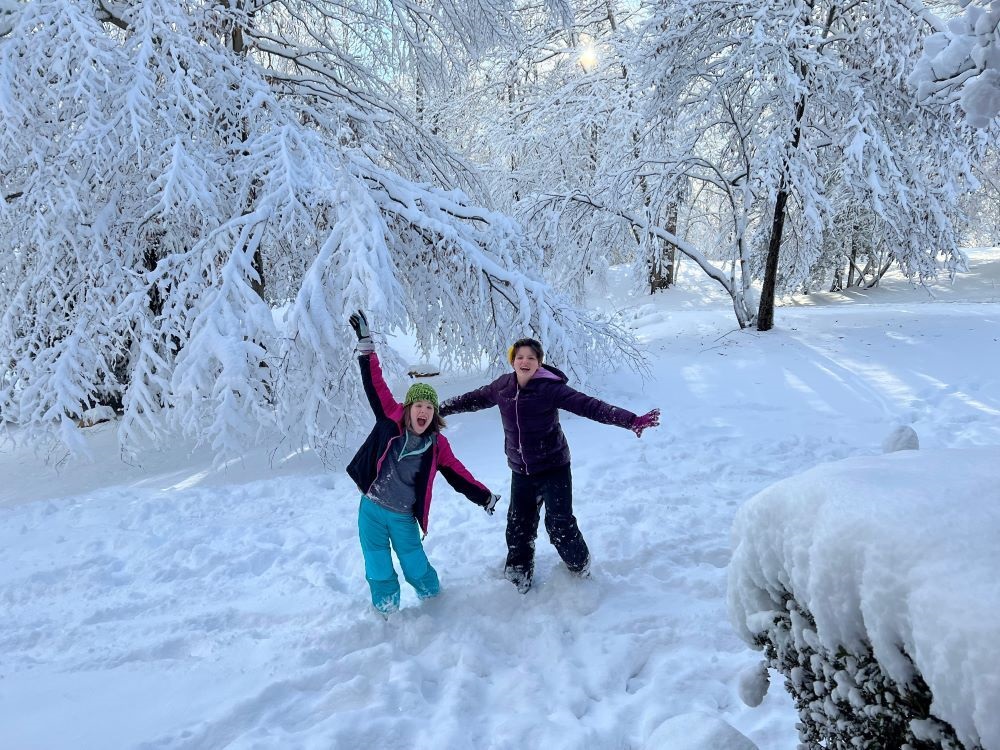The End of Snow Days?
The serendipitous day off may soon be a thing of the past.

A Facebook post about my kids being out of school for yesterday’s snow prompted the former blogger “John Lemon” to wonder about the predictions during the pandemic that the comfort we had gained with remote work and instruction heralded the end of “snow days.”
He cited a recent NPR report (“Snow days could become a thing of the past with virtual classes“) but I’d seen others like it months ago:
EYDER PERALTA, HOST: A long-held school tradition is evolving. A growing number of school districts are doing away with snow days. Instead of giving kids the day off, they’re having them learn from home. Kate Grumke of St. Louis Public Radio reports.
KATE GRUMKE, BYLINE: In states that get snow, the dark days of winter used to come with a fun upside for some students and teachers – possible snow days when school is canceled.
(SOUNDBITE OF PEOPLE SLEDDING)
GRUMKE: In St. Louis, snow days used to sound like this for the Obermark family.
(SOUNDBITE OF PEOPLE SLEDDING)
GRUMKE: But this year, the family’s school district is one of a handful here that aren’t planning to issue traditional snow days. Instead, Carter Obermark will be expected to log on to his fourth grade classes and learn from home.
CARTER OBERMARK: Then by the time we’re done, it’ll probably be dark outside, and we won’t get to play in the snow.
GRUMKE: Carter’s mom, Lauren Obermark, is feeling nostalgic about the change.
LAUREN OBERMARK: I don’t know why we would make a choice that feels kind of like we’re being punished.
GRUMKE: This is happening all across the country. Last year, almost 40% of school officials said their district had converted snow days to virtual learning days. This year, school officials have announced plans to do away with traditional snow days in New York City, Naperville, Ill., and Provo City, Utah, among other places. Other districts are doing a mix of snow days and online instruction.
Dan Domenech, who heads the American Association of School Administrators, says it’s a growing trend.
DAN DOMENECH: And I think that the pandemic and the remote learning acceleration and improvement is leading now to schools looking at the school calendar in a very different way and basically looking at learning as something that can take place anytime, anywhere.
Thus far, the local schools have decided to stick with the traditional snow days. This surprises me not in the least; most of the decisions administrators have made during the course of the pandemic were made with teachers and staff at the front of mind, with students and parents a distant afterthought, if that.
What’s interesting, though, is that the prediction has definitely come true with regards to white collar work. Government offices were closed yesterday but people were expected to telework. The Marine Base in Quantico, where I work and which got more snow than I did 30 miles further north, is closed for a second day but we conducted classes remotely yesterday. This was true even though it was the start of a new semester and the electives block, which meant that we had to coordinate with students we had never met on the fly.
The combination of these two is less than ideal: the kids are home from school and want to go play outside but parents are expected to put in a full work day. That’s a little tough! Additionally, quite a number of our students didn’t log in to class yesterday. Given that most of them are field grade military officers with a finely honed work ethic, I presume they were dealing with power outages.






It will be interesting to see if this sticks. In order to shift to remote school in literally hours, parents and kids will have to remember how to use teleconferencing software that hasn’t been touched in months and of course it will all have to still work despite OS upgrades, new server versions, etc. etc. It may be deemed not worth the effort if it takes until 11:30 before most kids are online…
More likely, they were dealing with their kids. And looking forward to a snow day.
We should go to year round school also. Nostalgic for the lazy, crazy days of summer but that is obsolete also.
@MarkedMan: It’s not as though snow in January is a black swan event. Planning and testing could indeed occur.
@Scott: I tend to think that, given how few snow days we have in this area, we should just give people the day off. But I do expect military officers to report to work when ordered to do so–especially if the reporting is logging in to a Google Meet room for two hours.
@Scott: I see teachers as the chief obstacle there. Their unions pretty much run our state and local governments.
@James Joyner: Here in Texas, we don’t have teachers unions. The biggest obstacles to year round school are the tourist industries dependent on teenage labor and parents. Personally, I would like more flexibility to schedule vacations when the prices are lower, not jacked up during winter and spring breaks.
@James Joyner: And yet, this doesn’t address the internet accessibility problem. It all assumes the only infrastructure issue is travel, which is rather idiotic.
If you remember, Fairfax County had to distribute portable wireless nodes so that everyone would be able to access the internet during the pandemic. That is a non-trivial task – it took days to weeks to get everybody up and running. You can’t do that on a snow day. And you can’t give some random piece of tech to students in, say, early November (because we do get snow in late Nov) and expect it to be accessible a month later the first time it’s needed. Likewise, we had assorted power outages in the area, so…so much for laptops and wireless access points.
I doubt that virtual learning is going to supplant snow days in any large districts. I suspect that St Louis is going to field at least a few parent objections to this plan as it goes forward when parents realize that their unusable or nonexistent internet connection means their kid gets marked absent.
@James Joyner:
Planning, sure. But testing? If it were adults in a work environment, I could see it. But how would testing get done without keeping everyone home for a day, or at least delaying them coming in? You are closer to it than I am (my “kids” are in their 20’s and are self sufficient tech-wise) but you are also a technical savvy person with a lot of experience getting online and using different apps who would be home with your kids when they were trying to get on. There are many, many students who don’t have that luxury.
@James Joyner: Before taking a dig at the teacher’s unions you should think about how the schools in VA, compare with those in the non-unionized states.
@James Joyner: “I see teachers as the chief obstacle there. Their unions pretty much run our state and local governments.”
You mean if your state didn’t have teachers unions, then all the teachers could simply be told to work an extra three or four months over what they do now with no raise in pay? Man, what a tragedy unions exist!
I am actually shocked that you had people who did not at least sign in. I am old, but I can tell you that as someone who was enlisted long ago snow was not an excuse to not show up at work. (As an officer I was stationed in Florida and Saudi Arabia, neither of which has a lot of snow.) Nothing short of a power shortage should have kept them from at least signing in to tell you that they had some household crisis. Must be some woke sissies you have there.
Steve
@MarkedMan: I’ve honestly been decidedly less than impressed with the quality of instruction. And I’m in Fairfax County, one of the richest districts in the country, and made the ratings of the associated schools a major factor when buying this house.
@wr: As a matter of principle, public employees (of which I’m one) should not be allowed to hold the public hostage. If we shifted to year-round schools, though, I would certainly expect that we would raise teacher pay accordingly.
Snow days amuse me. When I was growing up in Vermont (uphill, both ways) we never had snow days. Our parents would have felt affronted at the idea; it was just snow, what’s the big deal? I remember – barely, I must have been 5 or 6 – an ice storm that shut down a big chunk of our county and a couple of others for two days, but that wasn’t technically a school-only thing. In fact we felt like quite the intrepid pioneers skidding along the roads because the sidewalks were buried.
I was asked long ago – by a friend so I couldn’t say no – to contribute a short story to a collection. I don’t write short stories, I write 1500 page and 3000 page series. But, whatever. So I wrote a near-future story where school was anywhere and everywhere. Groups of kids might gather at Starbucks to learn some history, or sit at home learning algebra, or be in the back seat of a car, or on a beach, connected to a virtual classroom.
The second most important function of physical schools is babysitting. I think that’s a greater obstacle than the question of whether learning is possible in a virtual environment.
Of course, parents today could do what parents of yore did, boot the little urchins out the door and tell them to play in the snow and then every ten of fifteen minutes take a look on their activity.
@James Joyner:
I think that the chief obstacle would be state legislatures that would have to find the funds to pay for year-round school.
@ptfe:
Plus it would require all teachers to be able to be prepared, on an ad hoc basis, to teach from home. This seems unlikely.
@Steven L. Taylor: @James Joyner: We have a year round elementary school in our district that is very popular. Teacher work days are the same number as regular school. Rather than having a long stretch of summer off, there is 2 weeks in October, December, and March with 1 week in Nov and July. I don’t think there is much differential in cost.
Another obstacle is the primacy of sports over academics. Year round doesn’t accommodate inter district sport scheduling. Yet another parental objection.
They changed snow days in our Colorado district. There are two “normal” snow days a year, where everything is shut down. Starting with the third snow day, middle and high school are on a two-hour delay followed by synchronous remote learning. Elementary school remains closed to students, but teachers work remotely or on-site. We haven’t had a snow day yet, so it’s not clear how well this plan will work.
As far as technology goes, our district spent its Covid funds on IT resources. Now every student gets issued a laptop which they take with them and even do homework on. Those without access to internet connections can be issued a mobile hotspot. Of course, there is also federally-funded subsidies for essentially free or highly discounted internet service.
Despite the fact that remote learning sucks and has bad outcomes for most students, a school-issued laptop provides a lot of flexibility – I don’t need to buy and configure one for my kids, for starters. Secondly, if one of my kids isn’t feeling well, the decision to go to school or not gets easier, because there is now the option where they can stay home for the day and still get some school work done.
Snow days here are primarily driven by bus safety issues. If the busses can’t run safely, then it’s a snow day.
Also here in Colorado in the 1980’s, we had year-around schools (at least where I lived). This was mainly driven by not enough schools to handle the student population. Students were divided into three “tracks” with overlapping schedules. Two tracks would be in school at any one time and the third was on their “break.” I don’t recall if teachers worked year-round or were assigned a track. But this allowed the district to increase school capacity by a third.
It had its upsides and downsides. Initially, I was on the track where our “summer” break was in the spring. I quite enjoyed that because I could do a lot of spring skiing, and my Dad would take us on backpacking and hiking trips to Utah’s canyon country – and spring is by far the best time to go to that area.
Finally, I’m quite shocked you didn’t hear from some of your field-grade students James. Enlisted would at least be required to check-in, even if by phone or email, or there would be paperwork. Different spanks….
@James Joyner: ” As a matter of principle, public employees (of which I’m one) should not be allowed to hold the public hostage. ”
Some segment of the population says “we want schools to run year round.” Teachers say “we’re not interested in a sudden redefinition of our jobs which includes entirely restructuring our lives — especially since many of us made the trade-off to take these relatively low-paying jobs specifically because we wanted a career where we’d have the summer off.”
And this is the teachers holding the public hostage? Because they will actively object to having their work lives completely transformed? If your boss tells you he needs you to commute to Bratislava twice a week and you decline, are you holding the public hostage? Or are you expressing a little free will even though you are paid from tax dollars?
“If we shifted to year-round schools, though, I would certainly expect that we would raise teacher pay accordingly.”
I see you’ve just arrived in the United States! Have a great stay here!
@Steven L. Taylor: “I think that the chief obstacle would be state legislatures that would have to find the funds to pay for year-round school.”
And then there’s the question of who is going increase the curriculum by a third? Are the teachers going to have to do that, too? (Even though we’ve learned we can’t trust teachers, since all they want to do is make little white boys feel bad.)
And what about the infrastructure? I believe there are a lot of schools across the south that still aren’t air-conditioned. How will they work out in August?
@wr:
There are a lot of ways to do some kind of year-around school. And it doesn’t necessarily mean more teaching hours. Obviously, like anything, there will be advantages and tradeoffs to any system that would need to be considered compared to the status quo. Your mention of schools in the south without AC highlights the importance of making these decisions at the local and state level based on the needs of those communities.
Personally, I like the traditional system where schools are out during the summer. My kids have been in 4 different school districts in three different states and that seems to be a solid majority view by parents in my experience. If there is some movement for year-round school, I haven’t seen it.
The trend, at least in the districts where we’ve lived, is to offer more alternative school choices. One of our sons goes to an alternative school in our district and it’s a perfect fit for him. If we didn’t have that option we would likely have sucked it up and paid for private school somehow. It’s coming too slowly, but it’s good to see that at least some public school districts are moving away from the one-size-fits-all factory model of K-12 education.
@Not the IT Dept.: indeed! My first year teaching in Spokane had the district’s first ever snow day–at the request of the police department in honor of the minus 20 wind chill factor and the fact that most children didn’t ride buses to school.
@Michael Reynolds: Only the second? I think you’re too optimistic.
@Steven L. Taylor:
Oddly, that’s exactly what’s required of us. We got notice around 9pm Sunday that we would be remote Monday and many had to teach a course that had not previously met at 9am Monday. My elective didn’t start until 1pm, so I had a bit more notice!
@wr:
No, but I’m probably looking for a new job. My dad was working at the MP school at Fort McClellan, Alabama, which got closed as part of the BRAC process in 1999 and moved to Fort Leonard Wood, Missouri. Workers were offered a chance to relocate (I forget whether on their own dime or the taxpayers’) and he wound up retiring. But nobody asked the opinion of the employees of the base about it.
@Not the IT Dept.:
Yes, we in Canada are also amused by the concept of a snow day.
@MarkedMan: Or the teacher can just put an assignment on Google Classroom. Or declare the day a “make up/catch up day” like the teacher I substituted for yesterday–the first day back from break–did.
ETA: Either way, the impact need not be crucial given that in most districts the reason a child gets an excused absence can be as simple as “because I (the parent) asked you to.”
@Steven L. Taylor: Not a big problem. You change from a 192-day contract to a 270-day one. 😉
@Andy: “Despite the fact that remote learning sucks and has bad outcomes for most students,”
Ummm… you’re not supposed to bring that up. 🙁
@Andy: I saw what year-round school looked like in Korea. In K-12, the winter and summer breaks featured supplemental learning experiences–these interterm classes were where the vast majority of students got their visual arts instruction, for example, and in Daegu, my hagwon was hired to provide intensive English language training for students at various schools (and so much for the promise of a 20-hour instruction week with overtime paid at “X KRW”/per hour, but I digress…). For the five years I was at Woosong University, English instructors were required to work the summer and winter intersessions as part of our contract. The usual emphasis was to try to get some sort of enrichment experience for students who wanted it (I taught public speaking one term) or other short-term curricula. In Korea, the university administration did all the curriculum planning for ESL instruction, my task was mainly presentation.
@wr:
While I’m sure there’s specific districts where teachers are poorly paid, in general are teachers “relatively low-paying jobs”? Relative to what?
Even in the lowest paid state (Mississippi), the average teacher is earning twice the average state income.
Not saying teachers should be paid less, but I sometimes wonder if they hurt themselves with less well off parts of the public acting like most teachers are destitute.
@Scott: @James Joyner: School in summer? Sure, as long as voters are willing to compensate the teachers at a rate commensurate with their summer jobs for those months.
BWAHAHAHAHAHAHAHAHAHAHA… So, you’d much rather the public hold public employees hostage? Thru their govt agents?
Really James? Have you thought this thru at all?
@Stormy Dragon: “While I’m sure there’s specific districts where teachers are poorly paid, in general are teachers “relatively low-paying jobs”? Relative to what?”
This may be one of those urban/rural divide things. The 45k that a teacher makes in Mississippi is probably a pretty good income and I’d assume a lot better than many other jobs. 76K in New Jersey not so much, and even 84K in California — in any populated area — is going to leave you desperate for decent housing.
Agreed… but the problem is that the median income in San Francisco is $56K, so someone making $84K talking about how poor they are is probably going to make themselves look bad to the people making less than $56K.
Again, I’m not saying they shouldn’t push for better pay. Everyone should push for better pay. I’m just not sure acting like you’re a Dickensian street urchin is a good long term strategy when you’re not.
@Stormy Dragon: “Agreed… but the problem is that the median income in San Francisco is $56K, so someone making $84K talking about how poor they are is probably going to make themselves look bad to the people making less than $56K.”
Sure, but the education and training that teachers need is on a level with or close to that of other professionals who are much more highly paid. Yes, it’s true you make more teaching than working at Burger King or busing tables, but that hardly makes them royalty. People with similar levels of education are making tens of millions working for investment banks.
When you’re negotiating for a job do you say “Hey, full time at minimum wage is around 20k and there are people who make that, so why should I demand more?” Or do you say “people with my skill set are making far more money than I do, and if you try to give me any less I’m going to find a different gig”?
@Scott:
The school district that did that type of a schedule solved the problem of parental complaints about sports schedules by putting that program in most economically depressed neighborhood in town. The parents at that school generally don’t have money for sports fees (90% free and reduced lunches) so they don’t complain much.